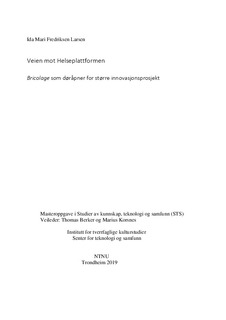| dc.contributor.advisor | Korsnes, Marius Berker, Thomas | |
| dc.contributor.author | Larsen, Ida Mari Fredriksen | |
| dc.date.accessioned | 2019-09-19T14:01:45Z | |
| dc.date.available | 2019-09-19T14:01:45Z | |
| dc.date.issued | 2019 | |
| dc.identifier.uri | http://hdl.handle.net/11250/2617802 | |
| dc.description.abstract | Helseopplysningene til innbyggerne i Norge ligger spredt i ulike journaler hos ulike virksomheter, slik at helsepersonell bruker mye tid på å lete frem informasjonen om pasienten fra andre aktører i helsetjenesten. I tillegg til at dette tar mye ekstra tid, øker det faren for at det kan skje feilbehandlinger og pasientskader hvis ikke helsepersonell har tilgang på oppdatert og korrekt informasjon om pasienten de behandler. Et felles mål er å samle alle dataene og sikre at kvaliteten er riktig, altså at informasjonen om pasienten er oppdatert til enhver tid (Ryvarden & Sivertsen, 2018). Videre skisseres fremtidens mål om å modernisere IKT-plattformen og etablere én felles løsning for hele helse- og omsorgssektoren i Stortingsmelding 9 (2012-2013) «Én innbygger – én journal». Epic System Corporation skal levere alle digitale systemer til Helseplattformen, som har fått oppdraget med å anskaffe og innføre ny, felles pasientjournal ved sykehus og kommuner i hele Midt-Norge.
Forventningen om at teknologi skal løse disse problemene er problematisk fordi vi ikke kan si noe om hvordan brukeren kommer til å bruke en teknologi før møtet mellom bruker og teknologi har funnet sted. Masteroppgaven baserer seg derfor på kvalitative intervjuer av brukerne av et operasjonsplanleggingsverktøy (OpPlan) med sikte på å skildre de ulike erfaringene brukerne har gjort seg i samspillet med verktøyet. Analysens teoretiske bakteppe er domestiseringsteori (Silverstone & Haddon, 1996, Sørensen, 2005) og virtuell domestisering (Skjølsvold, 2014).
Problemstillingen som oppgaven søker å svare på er:
Hvordan har OpPlan fungert på St. Olavs Hospital og hvilken lærdom kan vi trekke ut av erfaringene med OpPlan i møtet med implementeringen av Epic og teknologisk innovasjon i helsesektoren generelt?
Ved å analysere erfaringene som har blitt gjort kommer det frem at OpPlan, som er et eksempel på bricolage (Ciborra, 2002) kan ha fungert som en døråpner for teknologisk endring i større dimensjoner. Innføringen av og den relative suksessen til OpPlan viste at å involvere klinikerne med deres erfaringer og kompetanse på et tidlig tidspunkt i både planleggingen og selve implementeringsprosessen er viktige faktorer for å lykkes med teknologisk innovasjon. Av læringen fra suksessen til OpPlan antyder denne masteroppgaven at ved å fokusere på konkrete måter teknologi kan gjøre spesifikke arbeidsoppgaver enklere, kan dette hjelpe til med domestiseringen av Epic. | |
| dc.description.abstract | Today, Norwegian’s health data is deposited in different journals in a variety of organizations, and this causes health workers to spend much time looking for and retrieving patient’s information from actors other than their organization. Not only does this consume time, it increases the risk of incorrect treatment and health risk for patients if health workers lack access to updated and correct information about the patient in their care. A common goal is to collect all this data and secure its quality, meaning that the information about patients is updated at all times (Ryvarden & Sivertsen, 2018). Furthermore, in Report no. 9 to the Storting (2012-2013) titled “One citizen – one journal”, the goals for a modernized ICT-platform and the establishment of a common platform the entire health sector is laid out. Epic System Corporation will deliver all digital systems to platform and is charged with appropriating and implementing a new, common patient journal system at hospitals and municipalities in all of Mid-Norway.
Expecting that the technology will solve all the problems represented by today’s non-interconnected systems is risky because we cannot say how the users will employ the systems before the meeting between user and technology has taken place. This thesis concerns itself with a qualitative study of the users of a surgery planning tool called OpPlan, and is aimed through interviews with these users at conveying the experience these users have from interacting with this tool in their daily work.
The analytical and theoretical approach for this endeavor is domestication theory (Silverstone & Haddon, 1996, Sørensen, 2005) and virtual domestication og virtuell domestisering (Skjølsvold, 2014). The problem question in the thesis is “what are the user experience with the use of OpPlan at St. Olav’s Hospital? Furthermore, what bearing do these experiences have on the future implementation of Epic specifically and technological innovation in the health sector in general?”
By analyzing these experiences, evidence is found that OpPlan, working as bricolage (Ciborra, 2002), may have opened the door for future technological change of a greater dimension represented by. The relative success of OpPlan showed that involving clinicians with their experiences and competences in an early stage of implementation has been an important factor for achieving technological innovation. Learning from the success of OpPlan, the thesis suggests that by focusing on concrete ways in which technology may make specific workday tasks simpler, this can aid in the domestication of Epic. | |
| dc.language | nob | |
| dc.publisher | NTNU | |
| dc.title | Veien mot Helseplattformen Bricolage som døråpner for større innovasjonsprosjekt | |
| dc.type | Master thesis | |
